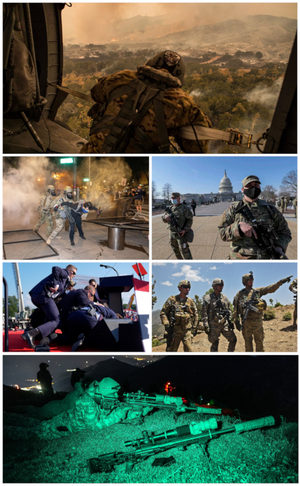Second American Civil War (RSA): Difference between revisions
Jump to navigation
Jump to search
No edit summary |
No edit summary |
||
| Line 1: | Line 1: | ||
[[Category:Wars]] | [[Category:Wars]] | ||
[[Category:Civil wars]] | |||
{{RSA icon}} | {{RSA icon}} | ||
{{NSC icon}} | {{NSC icon}} | ||
Revision as of 08:33, 24 December 2024
| Second American Civil War | |||||||
|---|---|---|---|---|---|---|---|
 Clockwise from top: A Californian soldier looks on at damage from the war; American army personnel guard the Capitol; American forces rally following their victory the Battle of Reno; A New English sniper takes aim near Pittsfield, Massachusetts; JD Vance swarmed by Secret Service agents moments after being shot; Willamettan forces capture Seattle. | |||||||
| |||||||
| Belligerents | |||||||
|
Free States Supported by: |
Supported by: | ||||||
| Commanders and leaders | |||||||
|
|
| ||||||
The Second American Civil War (October 19, 2031 – September 3, 2037), abbreviated as 2ACW, was a civil war in the United States/Reformed States between the R.S. (commonly known as "The Union") and the Free States, comprising New California, New England, Willamette, and the Hawaii Republic, who seceded in 2031 and 2032. The main conflicts leading to the war were the United States Term Limits Act, an act passed by Congress that was widely criticized as an authoritarian power grab, and the subsequent Term Limit riots that erupted across the nation.